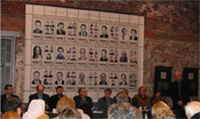From the 22 February to the 2 of April an exhibition “Political ‘Justice’ and Political Prisoners in Contemporary Russia” takes place in the museum and Public Center of Andrey Sakharov. The personages of the exhibition are people, who have fallen a prey to the politically motivated state despotism. The organizers of the exhibition believe that the existence of political prisoners and prisoners of conscience in the country is a menacing sign of present civil disaster. (20-MAR-06)
Text: HRH Moscow/ Yanina Savenko
The exhibition represents a project of stamps “The victims of political ‘justice’” by the artist Alexander Khlopov and supplemented with information about the personages of the exhibition, about their unjust sentences and faked criminal cases. – The portraits exhibited here represent only a small number of all political prisoners in the Russian Federation, – said the member of the organizing committee of the exhibition Oleg Orlov. And only one of them, the scientist Igor’ Sutyagin, has been recognized as prisoner of conscience by the Amnesty International.
 The lack of the competent discussion
The lack of the competent discussion
The former political prisoner, the founder of the Russian Research Center for Human Rights and Director of its programs, Alexey Smirnov believes that now there is no exact definition of the notion “political prisoner”. So we have every reason to believe that the reason of its absence is an intentional one and that a campaign for the mispresentation of the meaning of this notion is being carried on. According to Smirnov, only Stanislav Dmitrievsky suffered the indisputable political persecution from the traditional historical standpoint of that notion. The exhibition was met with a huge public response and has given rise to an active discussion of the notion “political prisoner” and of the necessity for independent judicial system in the Russian Federation.
The authorities divide people into ‘our people’ and ‘aliens’ inside the country
In the Soviet Union dissidents, who went to prison for defending human rights and religious or national liberation activities were identified as political prisoners. All of them were condemned first of all for their convictions, their activities didn’t violate international conventions for human rights and the international community advocated their  defense, including them in the list of prisoners of conscience. Today the situation has changed. Today´s political prisoners are people of absolutely different convictions, religions, age and incomes. It could be a man denouncing the criminal activities of the FSB; a National Bolshevik who had seized the office in the state institution; a gifted physicist, who supposedly had been increasing the strength of the People´s Republic of China defense capability, or a millionaire, whose political ambitions had frighten the President Putin, – said the former political prisoner journalist Alexander Podrabinek. Lately most of the political legal procedures have been cases under the Article of “Islamic extremism”. So recently the Supreme Court of the Russian Federation without any motivation in private has declared 15 Islamic organizations as terrorist.
defense, including them in the list of prisoners of conscience. Today the situation has changed. Today´s political prisoners are people of absolutely different convictions, religions, age and incomes. It could be a man denouncing the criminal activities of the FSB; a National Bolshevik who had seized the office in the state institution; a gifted physicist, who supposedly had been increasing the strength of the People´s Republic of China defense capability, or a millionaire, whose political ambitions had frighten the President Putin, – said the former political prisoner journalist Alexander Podrabinek. Lately most of the political legal procedures have been cases under the Article of “Islamic extremism”. So recently the Supreme Court of the Russian Federation without any motivation in private has declared 15 Islamic organizations as terrorist.
Tyranny of the authorities
According to the organizers of the exhibition, a “political prisoner” is a man, whose legal case is politically motivated by authorities. The authorities don’t feel embarrassed, breaking their own law concerning political prisoners and sending convicts to places located far away from their domicile and a place of the conviction. As soon as a prisoner has gotten a little bit accustomed to the new place he is transferred to a more distant prison with worse conditions without any explanations.
Existence of political prisoners is a sign of the totalitarian state
There couldn’t be any political prisoner in a democratic country at all, – considers Sergey Kovalev. Political prisoners could be only in totalitarian states, where authorities permit themselves to do everything, whatever they like and where the administration of justice is under control. Today each of the organizers of the exhibition can be convicted of presenting ‘terrorists’ to the public. The existence of political prisoners in the country is a sign of the moral civil crisis. The system, where the court fulfils the political order leads to more moral crisises in the society, first of all to the corruption.
Organizers of the exhibition: the Museum and Public Center of Andrey Sakharov, Russian Research Center for Human Rights (The Moscow Helsinki Group), The Committee “Civil Assistance”, Human Rights Institute, All-Russian Civil Movement “For Human Rights”, Public Committee for Defense of Scientists, Human rights center “Memorial”, Andrey Sakharov Foundation (Russia).





